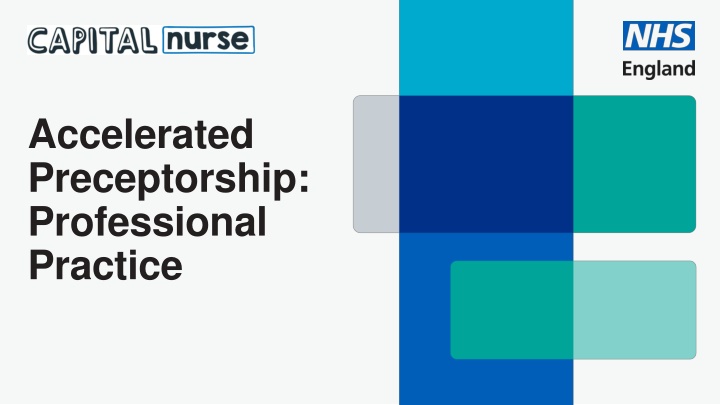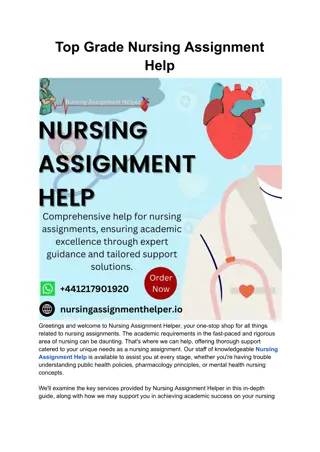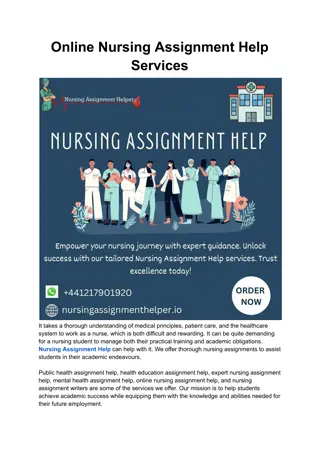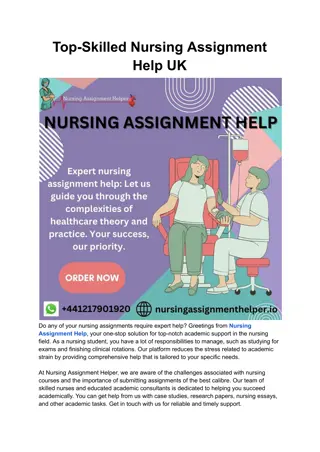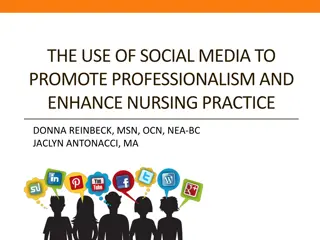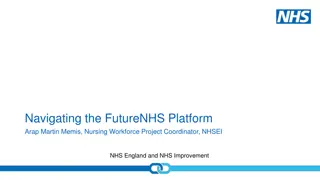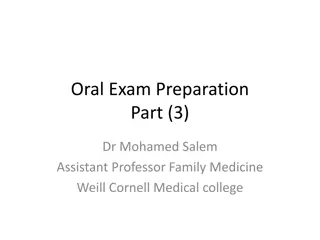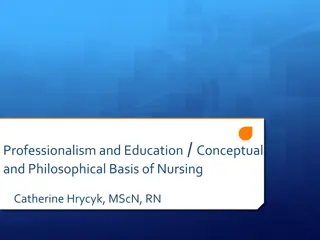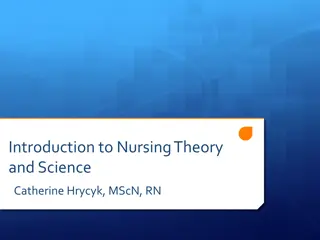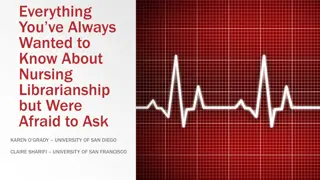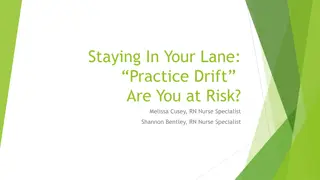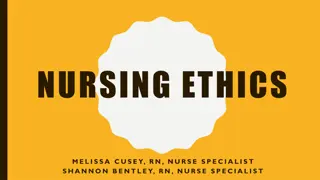Embracing Professionalism in Nursing and Midwifery Practice
Professionalism in nursing and midwifery involves understanding codes of conduct, accountability, and scope of practice. It requires being a role model, advocating for patients, and upholding professional values. Reflect on personal and organizational values to enhance performance and relationships in healthcare settings.
Download Presentation

Please find below an Image/Link to download the presentation.
The content on the website is provided AS IS for your information and personal use only. It may not be sold, licensed, or shared on other websites without obtaining consent from the author.If you encounter any issues during the download, it is possible that the publisher has removed the file from their server.
You are allowed to download the files provided on this website for personal or commercial use, subject to the condition that they are used lawfully. All files are the property of their respective owners.
The content on the website is provided AS IS for your information and personal use only. It may not be sold, licensed, or shared on other websites without obtaining consent from the author.
E N D
Presentation Transcript
Accelerated Preceptorship: Professional Practice
Session objectives By the end of the session, you will: understand your professional code of conduct and the application to your role in the workplace appreciate the professional standards of accountability, delegation and scope of practice be aware of the implications of social media. 2
Reflection What does professionalism mean to you? What does it look like? Consider five words that describe professionalism for you. Can you give an example of professional behaviour and an example of non- professional behaviour based on your observations? 3
Professionalism Professionalism means something to everyone who works as a nurse or midwife. Being an inspiring role model working in the best interests of people in your care, regardless of what position you hold and where you deliver care, is what really brings practice and behaviour together in harmony. The Nursing and Midwifery Council 4
Professionalism Being accountable Values Being a leader Beliefs Professionalism Being an advocate Attitude Being competent 5
Professional values There are 3 ways of talking about professional values: individual interpersonal organisational. Individual The three-overlap forming a complex picture of professionalism that is both individual but constrained or enabled by context. Interpersonal Organisational 6
Reflection What are your personal values and what do they mean to you? Consider your personal values and how these influence your work. Find out your organisational values and think about how these impact on your work and your department / team. 7
Professional values Inter- personal Organisation Personal Attitude Policies / Standard Operating Procedures (SOP) Communication Behaviour Relationships Codes / Ethics Appearance Role model Values Practice Trust Culture 8
Professional development Professionalism develops in different ways Media Previous employment Working environment, social media, press, society Work experience, part-time, full-time, casual Work based learning Role model On-the-job, experiential, observation and reflection Managers, supervisors, assessors, lecturers Education and training Professional and clinical skills Organisational environment Workplace, values, management style Personal background Upbringing, culture, values 9
Professionalism Develops in different ways (see previous slide). Professional and regulatory bodies support maintenance of professionalism through codes of conduct. For Nursing and Midwifery, please see https://www.nmc.org.uk/. 10
Professionalism is: Challenge Solve problems Take responsibility Reflect Evidence based Autonomous Innovative System thinker Honest A coordinator Accountable Leadership Taken from Enabling Professionalism, Nursing and Midwifery Council (NMC) Confident Clinically skilled Critical thinker Inquiring Resilient Emotional intelligence Compassionate Impartial Competent Advocate 11
Accountability and Delegation Accountability is the principle that individuals and organisations are responsible for their actions and may be required to explain them to others. Delegation of tasks from one individual to another occurs commonly in all health and care settings. Registrants must be accountable for their decisions to delegate tasks and duties to other people . only delegate tasks and duties that are within the other person's competence . make sure that everyone they delegate tasks to is adequately supervised and supported. NMC Code 12
Reflection Consider your level of accountability as a registered practitioner. What tasks could you delegate safely and to whom? 13
Scope of practice Your scope of practice is the limit of your knowledge, skills and experience and is made up of the activities you carry out within your professional role. As a health and care professional, you must keep within your scope of practice at all times to ensure you are practising safely, lawfully and effectively. NMC Code 14
Reflection Consider a situation where you have been / might be asked to do something that is outside your current scope of practice. How did / would the situation make you feel and why? How did / might you respond? 15
Benefits of social media Developing professional relationships Building effective networks Accessing forums to discuss specific issues Research Share best practice with other healthcare professionals Learning and development resources 16
NMC guidance Use all forms of spoken, written and digital communication (including social media and networking sites) responsibly. (The Code, paragraph 20.10) 17
NMC guidance Unlawful or unprofessional use of social media may jeopardise NMC registration and includes: posting pictures or information about patients inappropriate sharing of confidential information bullying or intimidating people building relationships with patients and service users stealing personal information or identity inciting hatred or discrimination encouraging violence or self-harm. 18
Appropriate use of social media Be informed of different social media types, advantages and disadvantages Think before you post! Maintain your professionalism Protect your reputation Think twice before accepting friend requests is it appropriate? Consider your profile and name 19
Reflection Consider your use of social media Reflect on who you associate with and the possibility of others posting pictures or comments about you in inappropriate posts Consider your own role in posting on social media 20
What would you do? Patients or family have added you on social media. A patient has given you money as a thank you gift. You have made a drug error. What is the duty of candour? You have a patient on Intravenous Antibiotics (IVAB) and they have a central line, you haven t used a central line before. Your patient requires a blood transfusion you haven t had the training. It is very hot on the ward and other staff are starting to wear scrubs instead of their uniform. Would you follow their example? If you don t want to do something, is that a reason to delegate it? 21
References Enabling professionalism in nursing and midwifery practice: https://www.nmc.org.uk/globalassets/sitedocuments/other-publications/enabling- professionalism.pdf 22
Acknowledgments Desiree Cox, Preceptorship Project Manager, CapitalNurse Catherine DesForges, Head of Education and Development for AHPs, Royal Free London NHS Trust Jules Marchant, Therapy Practice Development Lead, Guy s and St Thomas NHS Trust, and NHS England RePAIR Fellow 23
